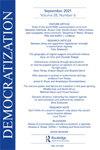“后真相后共产主义?”——中欧和东欧民主倒退背景下的信息导向游说
IF 2.9
1区 社会学
Q1 POLITICAL SCIENCE
引用次数: 0
摘要
摘要本文探讨了民主倒退如何影响利益集团在影响决策方面提供专业知识的价值。该分析是对活跃在国家层面的捷克、匈牙利、波兰和斯洛文尼亚能源、医疗保健和高等教育利益群体进行的原始调查。在过去十年中,这四个国家都经历了不同程度和形式的民粹主义和民主倒退。然而,所有三个政策领域的有效治理仍然需要专业知识。我们发现,去民主化确实对专业知识的提供产生了负面影响,但并不一致:倒退越严重,与执政党的密切关系就越有利于分享专业知识。然而,即使在去民主化的背景下,参与议会听证会/委员会对提供专业知识也至关重要。此外,集团间合作是专业知识交流的一个重要信号:拥有欧盟伞式成员资格和活跃的国内网络活动的组织在影响政策方面比缺乏这些资产的组织更重视专业知识。本文章由计算机程序翻译,如有差异,请以英文原文为准。
“Post-truth post-communism?” – Information-oriented lobbying in the context of democratic backsliding in Central and Eastern Europe
ABSTRACT This article explores how democratic backsliding affects the value of expertise provision for interest groups in influencing policymaking. The analysis is conducted on an original survey of Czech, Hungarian, Polish, and Slovenian energy, healthcare, and higher education interest groups active at the national level. All four countries experienced varying degrees and forms of populism and democratic backsliding in the past decade. Yet effective governance in all three policy fields still requires expert knowledge. We find that de-democratization affects expertise provision negatively, indeed, but not uniformly: the stronger the backsliding, the more a close relationship with governing parties matters for sharing expertise. Yet even in the context of de-democratization, participation in parliamentary hearings/committees is of pivotal importance for expertise provision. Moreover, intergroup cooperation is an important signal for expertise exchange: organizations with EU umbrella membership and active domestic networking activities attribute significantly higher importance to expertise in influencing policy than groups lacking these assets.
求助全文
通过发布文献求助,成功后即可免费获取论文全文。
去求助
来源期刊

Democratization
POLITICAL SCIENCE-
CiteScore
6.40
自引率
12.50%
发文量
73
期刊介绍:
Democratization aims to promote a better understanding of democratization - defined as the way democratic norms, institutions and practices evolve and are disseminated both within and across national and cultural boundaries. While the focus is on democratization viewed as a process, the journal also builds on the enduring interest in democracy itself and its analysis. The emphasis is contemporary and the approach comparative, with the publication of scholarly contributions about those areas where democratization is currently attracting considerable attention world-wide.
 求助内容:
求助内容: 应助结果提醒方式:
应助结果提醒方式:


